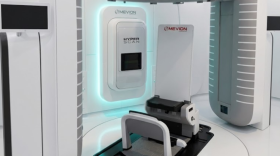Susan Wind’s daughter was diagnosed with papillary thyroid cancer at 16 years old. Soon after the family shared the news, Wind started hearing from her neighbors and other community members about their own families’ cancer battles.
She soon realized that something was wrong in her community of Mooresville, N.C., so she decided to investigate. Wind connected with researchers at Duke University and raised more than $100,000 to fund a study that uncovered higher-than-normal rates of cancer in Iredell County. Data from the North Carolina Central Cancer Registry shows the rate of thyroid cancer in southwestern Iredell County is more than three times the rate of the rest of the state between 2015 and 2016.
Host Frank Stasio talks to Wind about her family’s experience and how the community reacted to her discovery. Avner Vengosh also joins the conversation to share his ongoing research into cancer rates in Mooresville and his decade-long investigation into the health impacts of coal ash.
Mooresville is located across Lake Norman from Duke Energy’s Marshall Steam Station coal power plant. Developers in the community sometimes used coal ash as a way to create a strong and stable base for new construction — including near Lake Norman High School. Vengosh is a professor of water quality and geochemistry at Duke University’s Nicholas School of the Environment.
Interview Highlights
Wind on her daughter’s cancer diagnosis:
One day she developed a lump under her ear. They told me it was a swollen gland, [and that] I have nothing to worry about … We went through that for a year … And one day, my dental hygienist was actually telling me how she had cancer and how she didn't know for years. And then a lump developed on her neck, and that's how they found her cancer. It was Hodgkin's lymphoma. So that pretty much was an alert for me, and I rushed her to my doctor and said: Please test my daughter. I just have a bad feeling about all this. And seven weeks into testing, we got a full diagnosis that she had thyroid cancer and it spread throughout her neck.
Wind on the stories she heard after sharing her daughter’s thyroid cancer diagnosis:
Neighbors knocked on my door down my street. And they were like: Oh, did you know we had thyroid cancer? People [on my street and in other neighborhoods] started coming to me telling me they have thyroid cancer … Two more moms called me that lived across the street from each other in another neighborhood. They're like: Our daughters got thyroid cancer this year too. So people just started reaching out to me left and right about thyroid cancers and a lot of other cancers. And that's where I was shocked. And I asked my daughter's doctor at the time. I said: Is this normal all these thyroid cancers? And they were like: No, I don't think so.
Wind on the higher-than-average thyroid cancer rates in Mooresville:
Nobody should be blindsided with a problem in their environment they did not know about, and nobody should be blindsided with having a child being diagnosed with cancer. - Susan Wind
I just don't think this is a coincidence. And until the state officials and the health department can rule everything out, and not rely on just this one study that I had to commission myself, I'm not okay with it. And they tried to push me away. And nobody wants to say it could be something in the environment … And to me, it is — we vote for these people. We put them in a position to protect us and do the right thing. And I'm going to fight until they do the right thing. It's been two years, and I feel my only heroes are Dr. Avner Vengosh, Dr. Heather Stapleton, and other people they brought in on their team to help figure out: Is there something wrong? Because nobody should be blindsided with a problem in their environment they did not know about, and nobody should be blindsided with having a child being diagnosed with cancer.
Vengosh on the dangers of coal ash:
There is mounting evidence for — in our group at Duke and also for many other researchers around the country and around the world — demonstrating that high concentration of toxic elements — some of them are radioactive — in coal ash has a huge potential for causing human health [effects]. The only real question is that the pathways of exposure, and that's kind of the tricky thing: how people who are living or working next to coal ash would be exposed to coal ash. It could be through water. It could be through air.
Wind on coal ash in her community:
It was not regulated prior to 2015. It was never regulated. Builders used it as structural fill. Landscapers came to me who now have cancer. They were using it because it was mixed with top soil because it gave it — I was told — a very nice, pretty gray look in the landscaping. It was just used all over. And that was like, people pretty much said that's what we did here.












